Vegetarian meals and snacks are suitable for children as long as they’re planned to include a wide range of foods to meet their nutritional needs.
Vegetarian meals have become popular choices for many families and their children. Some of the main reasons for choosing a vegetarian diet is due to dietary preferences, as a way to eat more sustainably and to protect the welfare of animals. In fact, it’s estimated that around 2% of adults and children are vegetarian, according to the National Diet and Nutrition Survey, 2012 (opens in new tab).
What is a vegetarian diet?
According to the NHS, for vegetarians who eat dairy products and eggs, a healthy diet is the same for anyone else, but without meat or fish.
A vegetarian diet does not include:
- Meat or poultry
- Fish or seafood
- Insects
- Gelatine or animal rennet
- Stock or fat from animals.
Some children may need a diary-free diet or a diet that avoids eggs, because of an allergy to a specific animal protein, or because they are lactose intolerant. Families should be advised to seek support from their GP for allergy support and management.
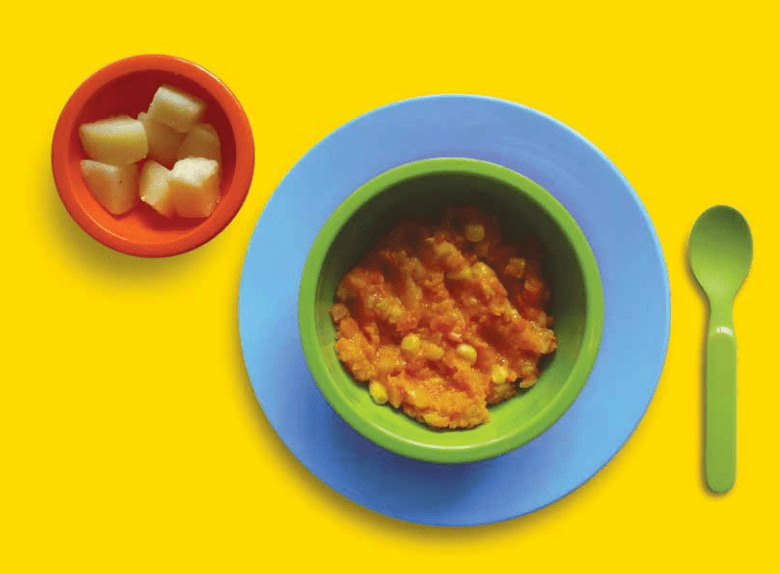
What are the differences between vegetarian and vegan diets?
In early years settings it’s important to be aware of children’s individual dietary requirements. Whether they are based on cultural, religious or medical needs, children’s choices, beliefs and safety must be protected.
There may be variations in the type of foods excluded, so here are some considerations:
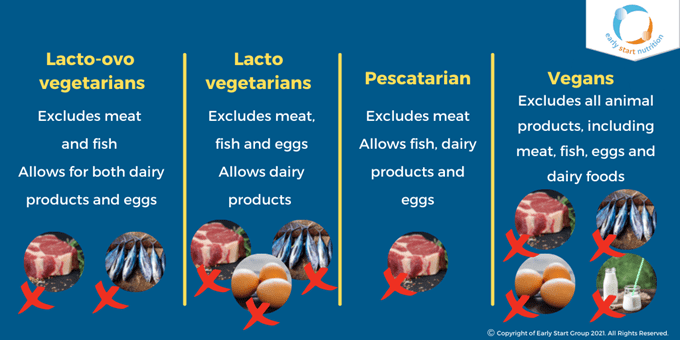
For advice on planning a vegan diet, check out our blog ‘Is a vegan diet suitable for young children’ (opens in new tab).
What are the recommendations for vegetarian children?
Infants and young children, in particular, need enough energy (calories) to grow and be active, and enough nutrients (protein, fat, carbohydrate, vitamins and minerals) to ensure they remain healthy. It’s possible for infants and children to get all the nutrition they need from a vegetarian diet as long as it is well-balanced.
The Eat Better Start Better (opens in new tab) food and drink guidelines provide guidance for early years settings to support children (including vegetarians) to achieve a healthy, balanced and nutritious diet.
Eating well in the first 6 months
Breast milk meets all the nutritional needs of infants in the first 6 months of life. Infant formula (based on either cows’ milk or goats’ milk) is the only suitable alternative to breast milk for babies under 12 months old. Soya-based formula should only be used on medical advice.
The following should be considered for soya-based infant formulas:
- Soya-based infant formula is suitable for vegetarian infants, but should not be given to infants under 6 months of age, and not used as the main milk drink for infants until they are over the age of 1, unless recommended by a health professional.
- Although soya- based milks are available, there is no evidence that they prevent food allergies or intolerance. They’re not recommended for infants who have a cows’ milk intolerance, as these infants may be, or may become, allergic to soya protein too.
- Soya-based formulas are more likely to cause dental decay, as they contain glucose rather than lactose. There are also some concerns about the high levels of phyto-oestrogens which can pose a risk to future reproductive health.
- A rice-based infant formula is available in Europe but this is not currently approved for sale in the UK. Families who buy this formula should be advised that the instructions for making the powdered milk up safely are not in- line with UK recommendations and they should seek advice from a health professional. Any milk alternative made from rice that is not a highly modified formula (e.g. rice drinks), must not be offered to children under 5, due to the arsenic content.
Milk alternative drinks
- Unsweetened calcium-fortified soya milk alternative can be used in cooking for vegetarian children from 6 months, but it should not be used as the main milk drink until children are over the age of 1.
- From the age of 1, babies can have unsweetened, calcium-fortified, plant-based drinks (such as soya, oat and almond drinks) as part of a healthy balanced diet. These plant-based drinks should be introduced one at a time, in very small amounts, so any allergic reaction can be spotted.
- Breast milk, or an appropriate first infant formula, should remain the main milk drink from 6-12 months.
Reference: First Steps Nutrition Trust, NHS (opens in new tab)
Eating well for vegetarian infants from 6 months
The recommended age to introduce vegetarian babies to solid foods is around 6 months (the same advice for non-vegetarian babies).
Babies and young children on a vegetarian or vegan diet can get the energy, and most of the nutrients they need to grow and develop, from a well-planned, varied and balanced diet.
First foods for babies around 6 months of age should include a wide range of unprocessed foods, including vegetables, potatoes, cereal foods (such as rice, oats, polenta, semolina, pearl barley), pulses (peas, beans and lentils), tofu, ground nuts (whole nuts should not be offered to under 5’s due to the risk of choking), ground seeds, and fruits.
For more advice check out our FREE parent Weaning Course (opens in new tab) on or book a space on one of upcoming weaning webinars (opens in new tab)!
Tips on how to offer a balanced menu for vegetarian children:
- All main meals (lunch and tea) must include a vegetarian source of protein, such as pulses, eggs and meat alternatives – these foods are also really good sources of iron
- Beans, pulses, eggs and other proteins can be provided as part of snacks once or twice each week e.g. hummus, egg fingers
- There is also the option to include protein foods as part of breakfast on some days and so for vegetarian children that might be beans or eggs
Suitable alternatives:
- Pulses e.g. kidney/other beans, chickpeas, red/green lentils, split peas, baked beans (low salt)
- Ground Nuts and Nut Butters (e.g. almond)
- Eggs (if included)
- Unprocessed tofu
- Soya beans (edamame).

Suitable alternatives with restrictions:
As outlined in EBSB, menus should limit bought and homemade products made from meat alternatives to no more than once a week. These include vegetarian sausages, burgers, nuggets and pies, and Quorn
A note on Quorn: Quorn is low in iron (made from mycoprotein which is a mushroom), energy and fat and high in fibre. If serving once per week we would recommend serving it with beans/lentils
A note on meat alternative products: These products are often high in salt and were developed for the adult market. Their salt content is not suitable for young children. Products made from meat alternatives (e.g. vegetarian sausages, Quorn) should be limited to once a week on your menus. Instead, choose high quality plant- based proteins, such as beans, pluses, lentils, tofu, etc

Other Considerations
- Vitamin C helps to increase iron absorption from vegetarian sources of iron, so be sure to provide fruit and/or vegetables with meals and snacks
- Include a variety of different protein sources across each week for example pules and beans two to three times, eggs and cheese, once or twice per week, and meat alternatives once or twice a week
- There should be one meat- free day for all children across your setting, once per week. So include vegetarian sources of protein on these days.
- When cooking for vegetarian children or children who exclude food items for religious or ethical reasons, it’s important to ensure that the food is not compromised in any way
- It’s not appropriate to pick meat out of a dish for a vegetarian child, the vegetarian dish should be prepared first, with an appropriate substitute such as tofu, beans or lentils, and then the meat can be added later for other children.
- It is important that food provided for vegetarian children is of a similar appearance and texture to the food given to other children.
Please see our example Vegetarian Menu for lots of inspiration when planning your menus: Early Start Nutrition Example Spring/ Summer Vegetarian Menu (Word, 110kb)
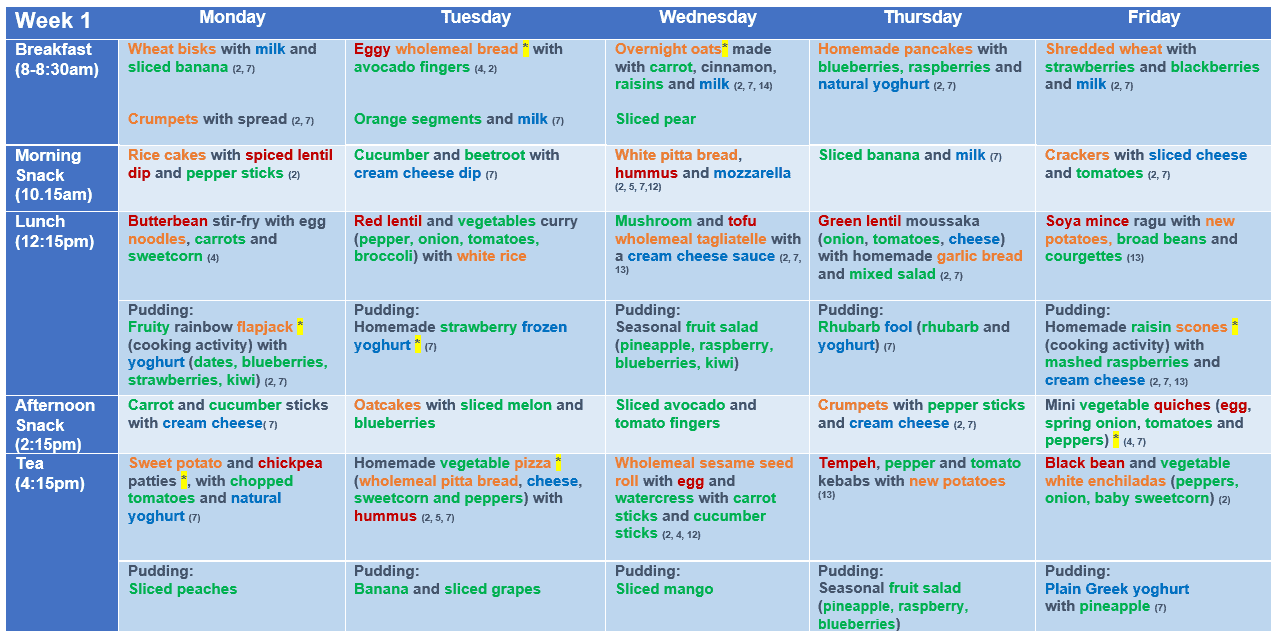
The following nutrients need to be considered for those following a vegetarian diet:
Iron
Iron is essential for the function of several bodily systems, particularly the pigmentation of red blood cells, called haemoglobin, which carry oxygen around the body. A deficiency in iron can cause anaemia. This results in less oxygenated blood, meaning the body receives less oxygen than it needs, which limits our ability to be physically active. Children with iron deficiency will often appear pale, tired and their general health, resistance to infection, appetite and vitality will be impaired. It’s important to speak to a healthcare professional if you are concerned about your child’s iron levels.
Suitable sources of iron for vegetarian children include:
- beans and lentils
- ground/smooth nut butters and seeds
- tofu
- fortified cereals
- dark-green leafy vegetables e.g. kale
- wholegrains, such as wholemeal bread and brown rice (please note that children need a variety of white and wholemeal)
- dried fruit, such as apricots and figs. Remember: offer these with meals, rather than as a snack between meals, to help prevent tooth decay.
Tip: The absorption of iron may be enhanced if foods or drinks rich in vitamin C are consumed at the same meal e.g. pepper, broccoli, cabbage, kiwifruit, pineapple.

Protein
Protein is needed for growth, maintaining and repairing body tissues, and to make the enzymes that control many bodily functions. Good sources of protein for children who eat some animal foods include dairy, eggs and fish.
Vegetarian children can get enough protein as long as they eat a good variety of foods each day. Plant foods that contain protein include:
- beans and lentils, and foods made from them – such as tofu, hummus and soya mince
- soya milk alternative and yoghurt (unsweetened varieties)
- seeds and finely ground nuts or smooth nut butters.

Calcium
Requirements for calcium are high in children aged 1-4 years. It’s needed for building and maintaining good bone health, for the transmission of nerve impulses, muscle actions and for many other bodily functions. Whole milk and full-fat dairy products are a good source of calcium along with
- Cheese
- Yoghurt
- Fortified plant-milks
- Tofu
- Beans and pulses
- Fish (when tinned with bones)
- Wholemeal bread
- Fortified cereals
- Dark green leafy vegetables such as broccoli.

Vitamin B12
Vitamin B12 interacts with folate and vitamin B6. Together, these vitamins help the body to build up its own protein. B12 is essential for the formation of red blood cells and a healthy nervous system. It’s mainly found in animal foods, including eggs, cheese and milk and so vegetarian children are likely to receive sufficient amounts.
Foods that are often fortified with vitamin B12, include:
- breakfast cereals
- soya yoghurts, and non-dairy milks such as soya, oat and almond (300-400ml of fortified unsweetened milk alternatives will provide adequate vitamin B12 (about 1.5 micrograms a day))
- yeast extract– choose a brand with no added salt.
It’s always best to speak to your GP if you’re worried that your child may have a vitamin B12 deficiency.

Iodine
Iodine is essential for the production of the hormone thyroxine, which affects the function of the thyroid gland. It’s used to regulate the body’s metabolism, and affects the heart rate, body temperature and how the body uses energy from food. It’s also important for brain development.
Iodine is found in a range of foods, the richest sources being fish and dairy products. Seaweed is a concentrated source of iodine, but it can provide excessive amounts (particularly so in the case of brown seaweed, such as kelp) and therefore eating seaweed more than once a week is not recommended, especially during pregnancy. White fish contains more iodine than oily fish. Milk and dairy products are the main sources of iodine for most people.
Soya milk is rarely fortified with iodine (check the label) and therefore will not replace the iodine in cows’ milk.
Omega-3
Omega-3s are a family of fats that are important for our health. They’re mainly found in oily fish, such as salmon and mackerel.
Other sources of omega-3 include:
- flaxseed (linseed) oil
- rapeseed oil
- soya oil and soya-based foods, such as tofu
- walnuts – offer these ground or as a nut butter for children under 5 to reduce the risk of choking
- eggs enriched with omega-3 (for non vegan children).
Omega-3 fats are found in both animal and vegetable foods, but vegetable sources of omega-3 fats do not provide the same fatty acids as those from animal (fish) sources.
Although alpha-linolenic acid (ALA) is present in vegetable oils and seeds such as rapeseed, soy, flaxseed, hemp, chia and walnuts for example, ALA is poorly converted into DHA and EPA – the fatty acids that are associated with better heart health and that are found in fish oils.
Vitamin supplements for children
The Department of Health recommends that all children aged 6 months* to 5 years are given vitamin supplements containing vitamins A, C and D every day.
It’s also recommended that babies who are being breastfed are given a daily vitamin D supplement from birth, whether or not mums are taking a supplement containing vitamin D.
*Babies who are having more than 500ml (about a pint) of infant formula a day don’t need vitamin supplements because formula is fortified with vitamins.
Vitamin supplements for breastfed infants
It’s recommended that all breastfed babies have a supplement of 8.5-10 micrograms of vitamin D a day from birth (or in some areas, from 1 month).
Healthy Start vitamin drops are suitable for use from birth, but vegan families may not want to use these for their infants as they include vitamin D sourced from sheep’s wool- lanolin.
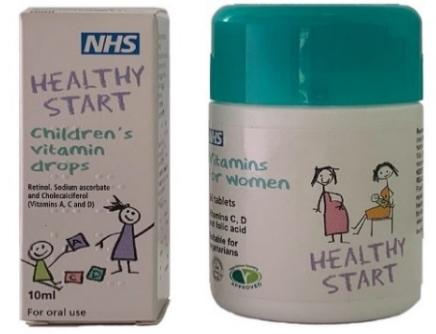
Vitamin supplements for 1-4 year olds
Abidec vitamin drops are suitable for vegan children. A daily recommended dose of o.6ml, will provide around 700 micrograms of vitamin A, 10 micrograms of vitamin D, 0.4mg thiamin, 0.8mg riboflavin, 0.8mg vitamin B6, 8mg niacin and 40mg vitamin C.
Families may prefer to give vitamin D separately, in the form of Vitashine spray (available from pharmacies), which provides 25 micrograms of vitamin D a- day and is within safe limits for children aged 1-4 years, providing the dose is not exceeded.
Families who wish to provide additional vitamin B12 and iodine should ask their pharmacist or another health professional for advice about a suitable supplement for their child.
Information about suitable supplements can also be found on The Vegan Society website (opens in new tab), but families are strongly advised to seek advice from a health professional to ensure they do not provide harmful doses of any nutrients to their child.
If you’re an early years professional, you can learn more about the Vitamin D requirements for children in our blog Vitamin D Requirements for infants and toddlers (opens in new tab)!
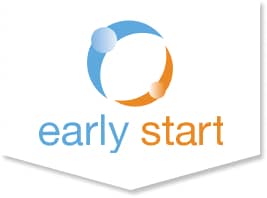


Assist a child suffering from kwashiokor of vegetarians to get enough protein explain
Many thanks for taking the time to read our blog which I hope you found useful. For additional support for children with kwashiokor I would recommend, in the first instance, to speak to your GP. Our blog provides a general overview of the latest recommendations to support children following mainly a plant based diet and without any medical conditions.
Best wishes,
Early Start Nutrition